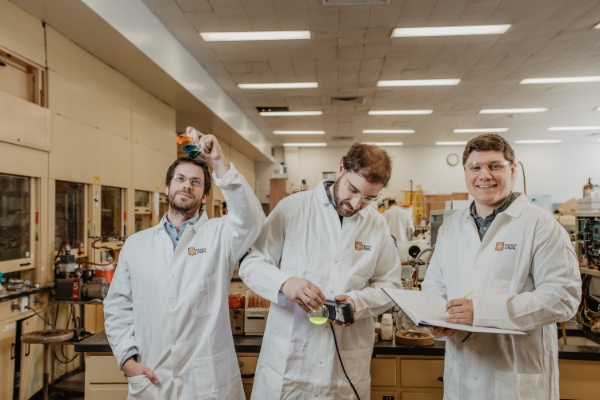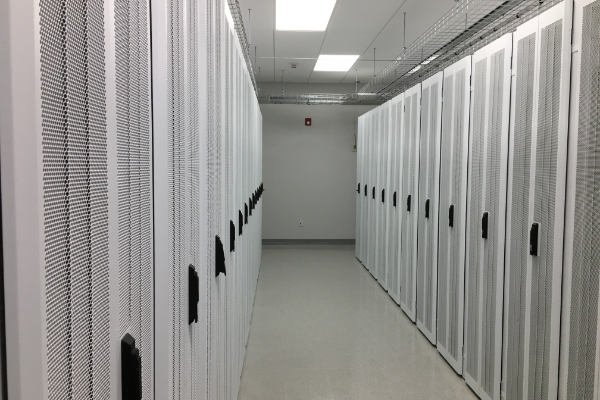
Priority 2 – Connected research
As a transformative and high-impact institution, Université Laval is determined to connect to its home environment and the entire world. To do so, we have equipped our community with cutting-edge digital infrastructure.
2.1 Connected to society
The complexity of the challenges we face requires partnerships and alliances that combine different types of knowledge and experiences to generate tangible benefits for society. As such, Université Laval’s professors constantly collaborate with other scientific teams and partners in a wide variety of settings in Québec, across Canada, and around the world. The University will keep supporting these synergies, which are powerful catalysts for innovation, while creating and developing new strategic partnerships. In this realm, the University is unique for its variety of partnership governance models that have proven their ability to deliver lasting impacts.
In the next few years, this valuable interaction will continue to make a critical contribution to ULaval’s research and innovation teams by expanding their competencies and their local, national, and international repute. The University is also counting on the positive aspects of this partnership approach to attract new talent.
In this strategic plan, Université Laval has prioritized the development of research results and scientific entrepreneurship. As a high-impact university, the University knows it has a major responsibility in promoting and mobilizing knowledge and expertise, particularly so that users and stakeholders can understand and adopt technological and societal innovations. As a transformative university, it must encourage the transition from the discovery of knowledge and expertise to their practical application. We also understand our key role in developing an entrepreneurial culture in a variety of fields and disciplines.
Each in their own way, Université Laval’s research and innovation teams will not only keep learning and discovering, but also transferring new knowledge to a variety of settings and users. Through its research, the University will champion practices and cultures that support the development of more innovative societies, particularly by encouraging scientific entrepreneurship.
Université Laval’s community has vast and valuable expertise that offers a thoughtful perspective on societal needs and local and global issues. This provides insight needed to set and shift research and funding priorities. Many members of the research community are already involved in the main groups and organizations that set major national and international research priorities. The University wants to further encourage and enhance this involvement and add more to discussions about societal challenges and needs in terms of discovery, knowledge acquisition, and innovation.
Communication between science and society occurs through interactions between multiple stakeholders from academia, civil society, and decisionmakers. These relationships provide opportunities to discuss major societal issues and bring together scientific, political, social, cultural, economic, and environmental perspectives to find solutions based on proven knowledge and facts. To fully play its part, the research community must keep actively contributing to these conversations, particularly at a time when the role of science is in question. The University encourages faculty and their research teams to play their role as change agents by continuing and expanding their science outreach and mediation efforts. To support this work, the University plans to create innovative spaces to foster dialogue on complex subjects founded on collective intelligence and respectful consideration of diverse viewpoints.
2.2 Connected to the world
In its 2017–2022 Strategic Plan, Université Laval committed to a greater global presence. This objective entails increasing student and faculty mobility, creating research and study pathways that encourage contact with other cultures and knowledge, recruiting globally, and developing capacity-building international collaborations. From a research and innovation perspective, the University wants its community to participate in and win more major international competitions. It also aims to encourage the creation of sustainable strategic partnerships, especially with other major research universities around the world. The University also plans to increase and extend the research community’s participation in international networks of expertise and improve access to major research infrastructures. More broadly, we will optimize our support processes for the development of international research projects.
Since major societal challenges now reach beyond borders, international research collaborations have become inescapable. ULaval’s research community, which is already active on all continents, adds to the University’s reputation while helping us recruit top research talent. While ULaval is already known for its international leadership in many areas, we want to raise the University’s profile even further in both emerging and established fields to offer greater access to knowledge and build diverse and original partnerships. Our reputation is key to our drawing power, development, and status in the global scientific community. The University will therefore create and implement a national and international communication strategy to attract the most talented students and faculty. We will also strengthen collaborations that will bolster Université Laval’s research expertise in Canada and around the world.
2.3 Connected by digital technology
For Université Laval and other universities around the world, digital technology has become an extremely powerful tool for connecting members of the research and innovation community and boosting the development of knowledge and expertise. In the past few years, the University has created many collaborative digital platforms to support research activities. These platforms encourage dynamic interaction between researchers, allowing them to share expertise, research data, and results. This development plan reiterates the University’s determination to keep designing these kinds of platforms to give members of our scientific community secure, powerful, and reliable technological tools as well as cutting-edge services to collect, develop, and analyze data.
University management, faculty, and research teams have come to rely on digital technology. From supporting research projects and allocating research funding to submitting reports and developing research infrastructure and equipment, there is a concrete and constantly evolving need to collect and analyze data quickly and efficiently using complex processes. In its 2021–2023 Digital Strategy (in French only), Université Laval has committed to using agile technological solutions to make it easier to manage research and innovation at all levels. We will keep developing digital tools for our research community so we can broaden access to and use our institutional data to become more agile and efficient.
Our community in action

Research to promote Québec gastronomy
The GastronomiQc Lab, a joint food sciences research unit created to promote Québec gastronomy around the world, is a unique space for collaboration and networking. Professionals in the restaurant, production, and processing sectors, among others, benefit from its research and knowledge transfer activities. The Lab offers training for specialists, international forums, and the opportunity to develop new knowledge and skills to help the industry innovate and be more competitive.

Bringing research results to life
Knowing that a simple idea generated by research results can make a big difference in the world, the University supports entrepreneurship in a multitude of fields and disciplines. Through scientific entrepreneurship, the University’s community brings innovative ideas to market and improves quality of life at the individual and community level.

Connecting research to society
For over 20 years, the AELIÉS Public Chair has held a crucial mission: to make the University’s research—and especially its results—accessible to all. Through its “En Savoir Plus” (To learn more) lecture series, the Chair gathers people from various backgrounds to shed light on current issues like stress or climate change. The Chair also created the Neo competition to provide graduate students with a platform for scientific outreach.

Collaborating to bolster research
What do the University of Lausanne in Switzerland and Université Laval have in common? Besides a longstanding collaboration, the two institutions have been part of a joint international research unit (JIRU) since 2016. This research unit brings together cutting-edge expertise in a world-class centre of excellence in neurodevelopment and child psychiatry. JIRU is raising the profile of multi-centre studies on large patient cohorts to make an even bigger impact and push the limits of research.

Supporting sustainable development in the Arctic
Thanks to world-renowned expertise in northern research and its sustainable development work, Université Laval was chosen to host the permanent secretariat of the Arctic Council Sustainable Development Working Group (SDWG). ULaval will help the SDWG provide Indigenous communities with practical knowledge and bolster their capacity to address challenges and opportunities in the Arctic.

Joining forces for sustainable health
Alliance santé Québec (AsQ) is an unprecedented collaboration that brings together the health and social services research and innovation community in the greater Québec City area to expand the research capacities of this entire learning ecosystem. Since 2013, AsQ has worked to maximize social, economic, and scientific outcomes to improve individual and population well-being from a sustainable health perspective.

Using cutting-edge technologies to optimize data
PULSAR offers technological and collaborative solutions for sustainable health research. This platform is the only one of its kind in Québec, allowing users to share and exploit data to improve health and well-being. And thanks to VALERIA (in French only) and the Centre de valorisation des données (Data exploitation centre, site in French only), the research community also has access to secure,efficient solutions to store, collect, transfer, and process data in all disciplines.

Key information within easy reach
Argus is an innovative digital environment designed to facilitate the University’s research management. The tool is being developed iteratively to gradually offer useful applications that are adapted to everyone in the research community. Members save time and energy by using tools that are simple, accessible, effective, and directly relevant to their work.

